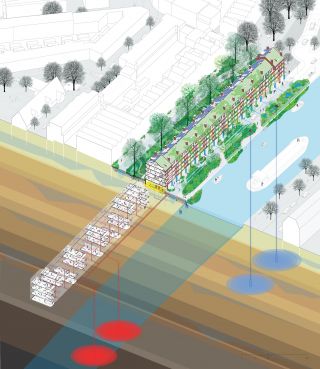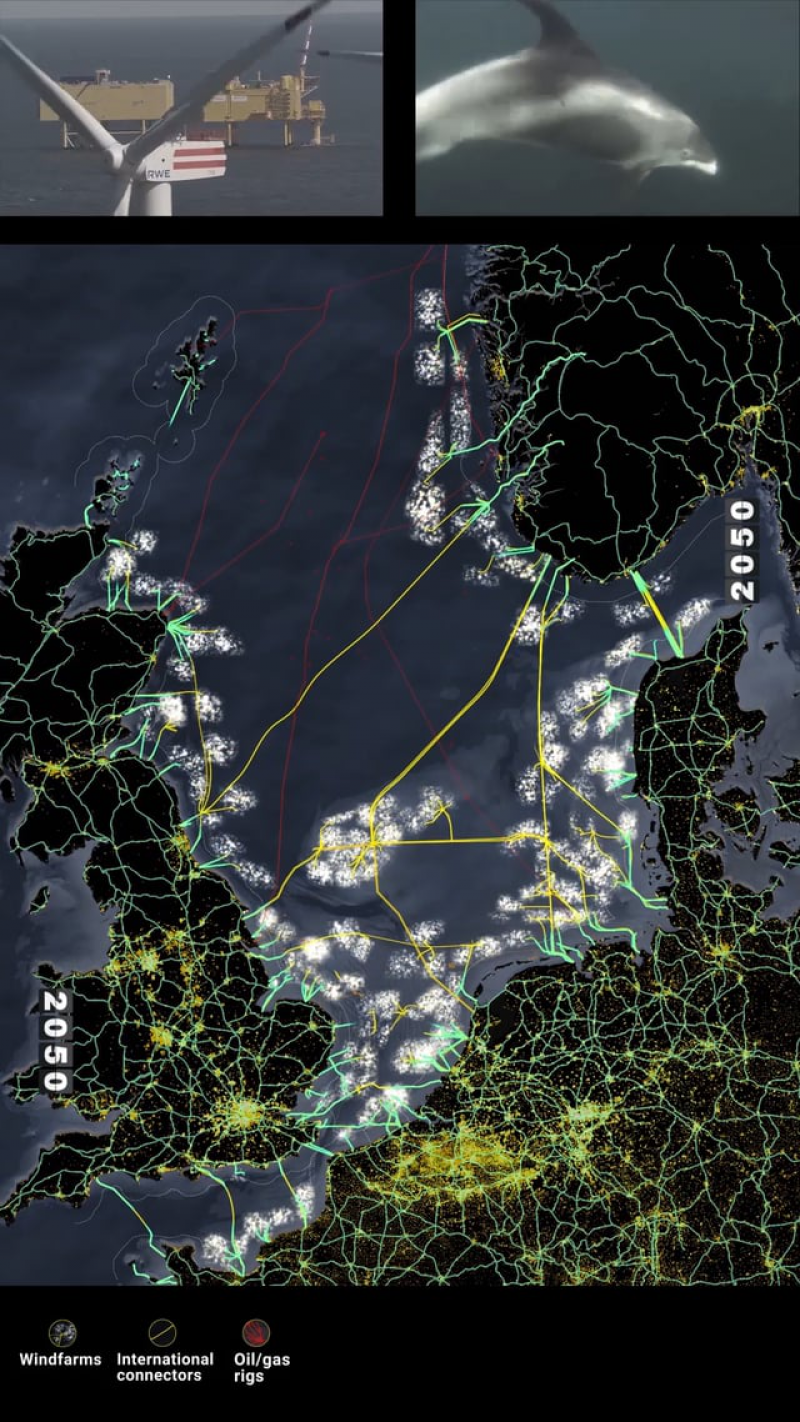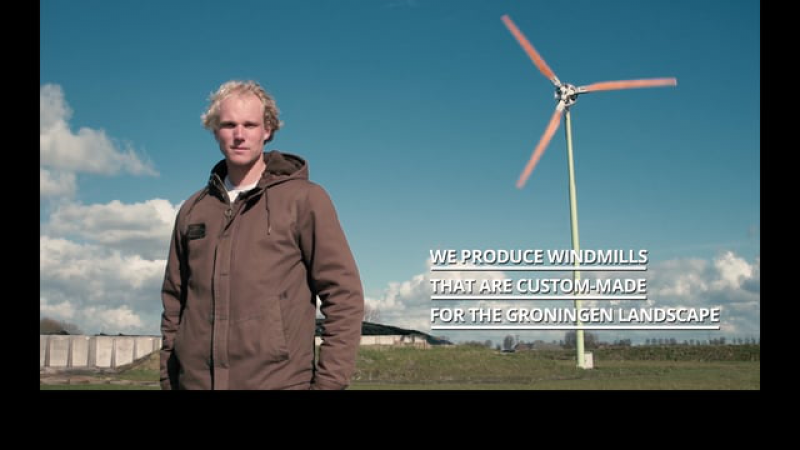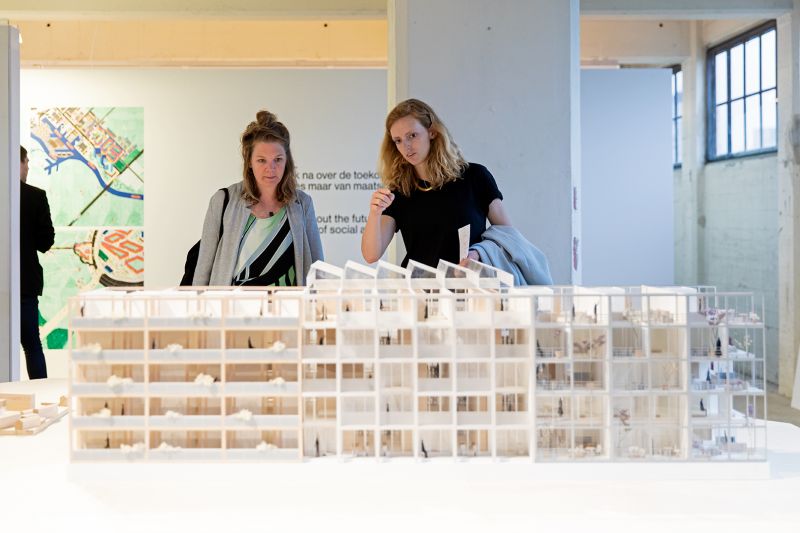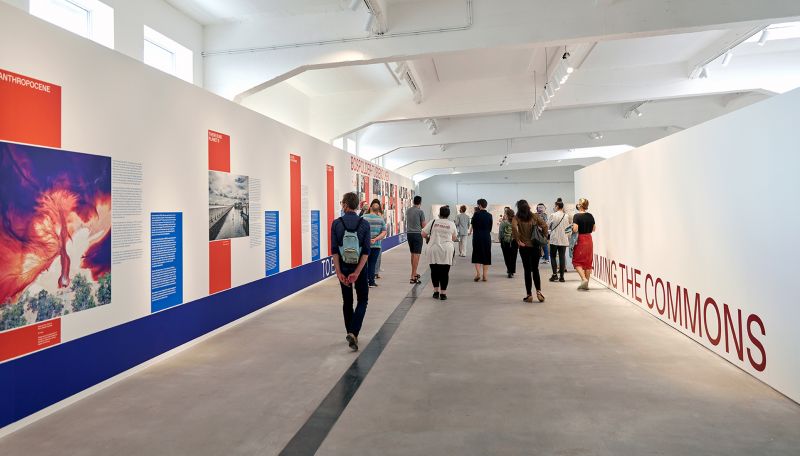
DOWN TO EARTH: RECLAIMING THE COMMONS
picture: Aad Hoogendoorn
The transition to renewable energy is urgent, but also almost unimaginably far-reaching. Urgent because the petroculture that characterizes modern civilization contributes greatly to global warming and climate change. Far-reaching because the way we live and care, learn and live, consume and produce; because what we eat and how we eat, how we move around and how we interact with each other and with nature – in short, because how we organize our living environment and our coexistence and whether everyone has equal opportunities, is largely determined by access to and use of energy.
Our use of energy has an impact on our economy and our culture. But the era of petroculture, the feast of fossil expressionism, is coming to an end. The energy transition is now the elephant in the room of politics. It is therefore crucial that we reconsider ownership of the transition to a sustainable energy supply. That we underline that the energy transition cannot take place without a social transition.
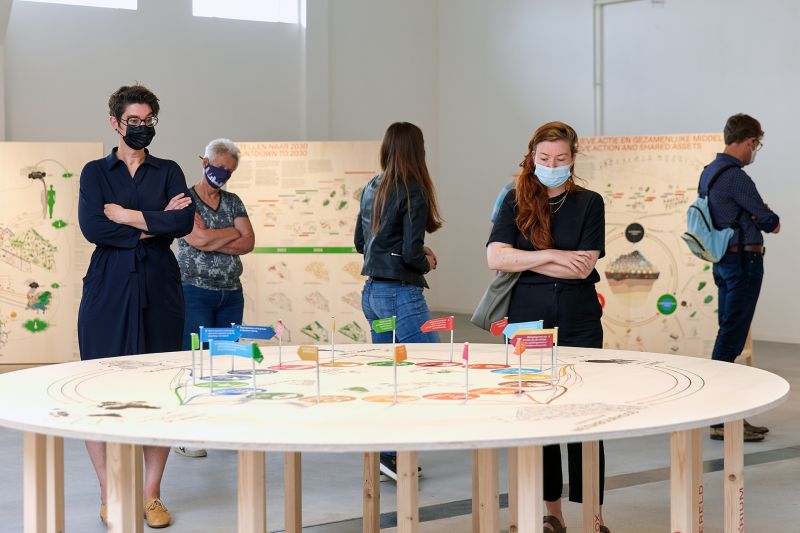
DOWN TO EARTH: RECLAIMING THE COMMONS
picture: Aad Hoogendoorn
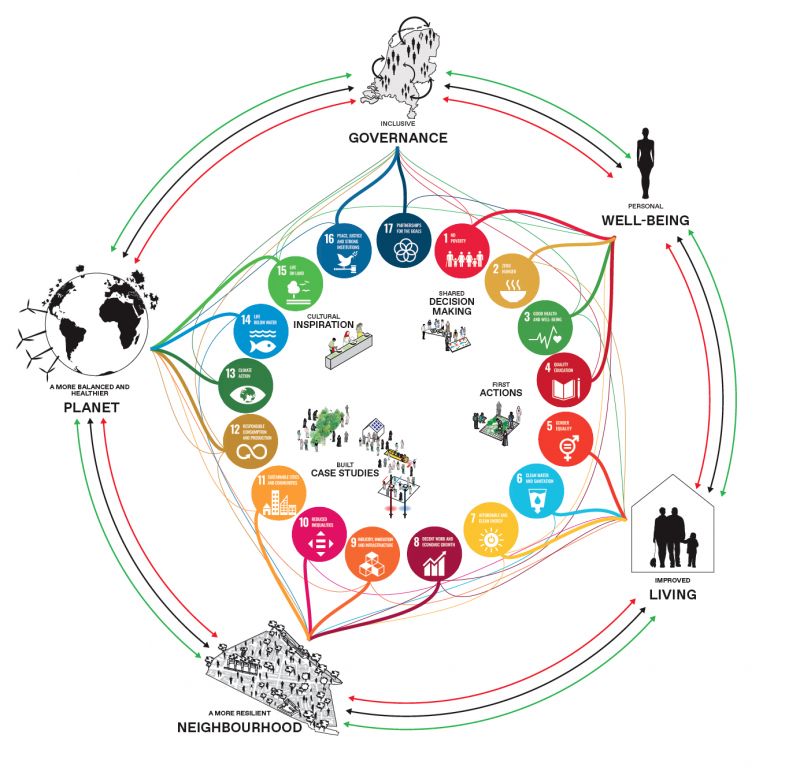
Toolbox: The World and the Neighborhood (work in progress)
image: OOZE, IABR–Atelier Rotterdam
The exhibition RECLAIMING THE COMMONS is the 2.0 version of WHOSE ENERGY IS IT, ANYWAY?, the exhibition we had to close after only three weeks, last December, because of the lockdown.
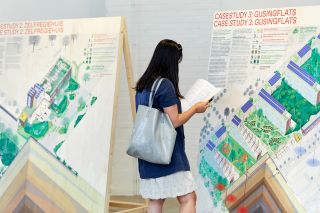
DOWN TO EARTH: RECLAIMING THE COMMONS
picture: Aad Hoogendoorn
In RECLAIMING THE COMMONS the curators, George Brugmans and Thijs van Spaandonk, go a step further. Their starting point is the observation that energy was once part of the commons: that which belongs to all of us and that we take care of together. And that we might want to look at it that way again: after all, since the sun, wind and hydrogen belong to everyone, the transition to sustainable energy should belong to us all, too. So how can we reinvent the commons for the twenty-first century? The energy transition is the elephant in the room of politics. It’s high time to say: No energy transition without social transition – RECLAIM THE COMMONS!
Click here for more info about WHOSE ENERGY IS IT, ANYWAY?
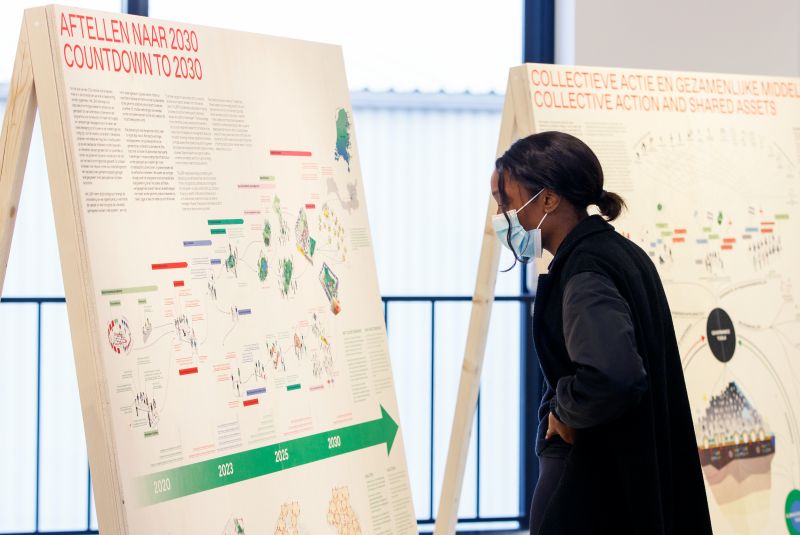
WHOSE ENERGY IS IT, ANYWAY?
picture: Aad Hoogendoorn
IABR–Atelier Rotterdam: the energy transition as a lever for change in the urban district
In the Netherlands, according to the National Climate Agreement of 2019, circa 5,000 districts will have to become gas-free. Initial experience shows that this is not at all easy. There are many complications, for instance with implementation and, above all, financing and local support. Actually, we just don’t know yet how to wean our districts off of natural gas.
In Rotterdam too, all districts have to be weaned off of natural gas. The city pointed to five to lead the way. One of these is Bospolder-Tussendijken, also known as BoTu, one of the poorest districts in the Netherlands. But it is not only fragile, it is also resilient: culturally diverse, empowered and self-aware. That is why the IABR chose BoTu.
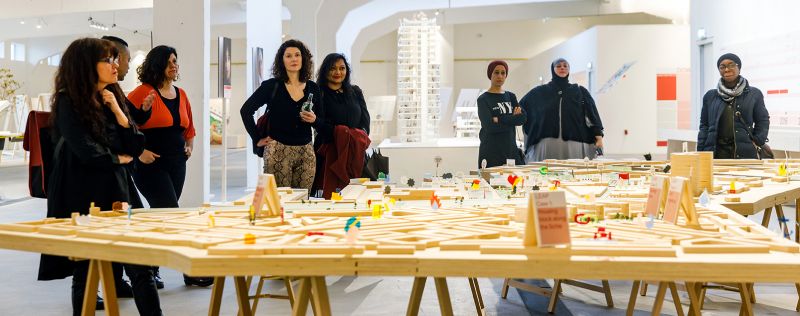
Reclaiming the Commons
foto: Aad Hoogendoorn
In BoTu the IABR–Atelier Rotterdam, a collaboration between IABR and the municipality of Rotterdam, has spent the past two years exploring how the energy transition that is inevitable can be a lever for what is aspired to. Can residents really become co-owners of the transition and in such a way that it contributes to social inclusion and the sustainable improvement of their living environment and quality of life?
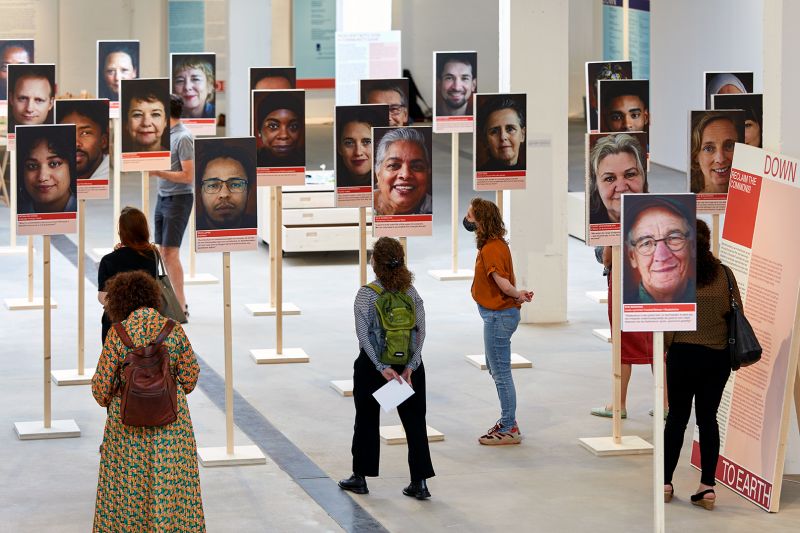
DOWN TO EARTH: RECLAIMING THE COMMONS
picture: Aad Hoogendoorn
From building blocks to Local Energy Action Plan
Atelier Rotterdam first researched the spatio-energetic building blocks needed for a future, truly resilient BoTu, for it to become clear what the specific energy challenge in BoTu actually is. Then, an anthropological exploration by the Atelier of the known and unknown, often invisible social networks in BoTu provided insight into the potential power of residents. To what extent can and do they want to be co-producers of their living environment and take responsibility for the transition? An identification of the social building blocks needed to link the energy transition to other, more integral local challenges, such as the sustainable improvement of quality of life and the living environment.
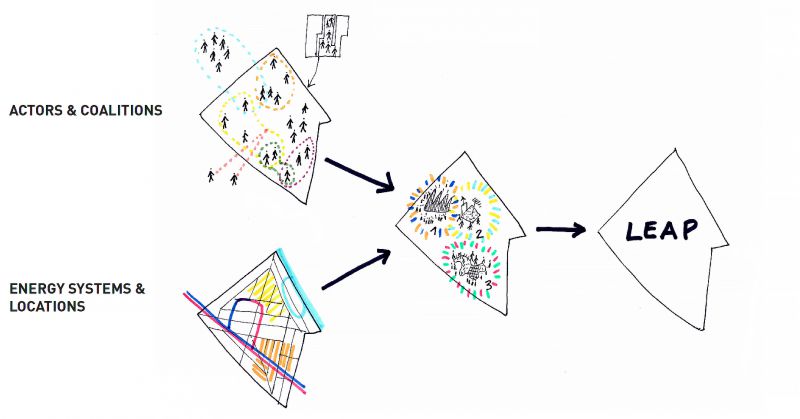
Towards a LEAP
© IABR, Ooze

Virtual workshop LEAP
picture: Yonca Özbilge
Therefore, the exhibition is also conceived as a launching pad for activities which we float in the summer of 2021 in BoTu itself.
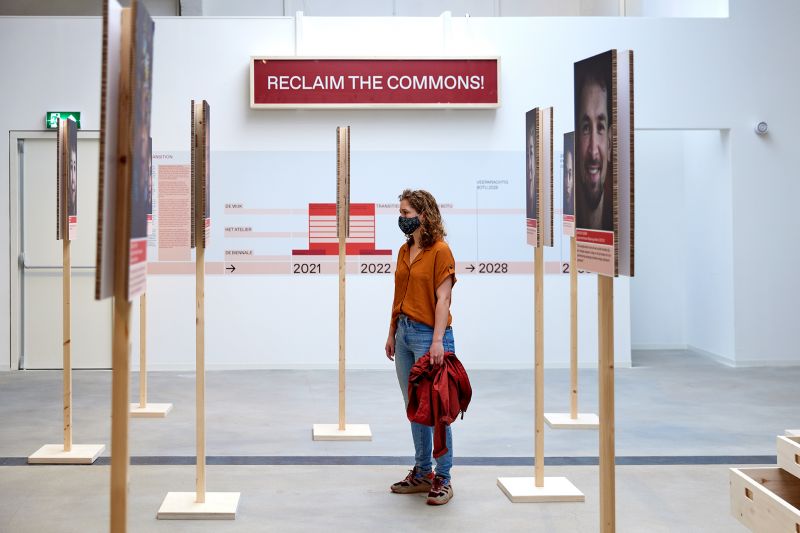
DOWN TO EARTH: RECLAIMING THE COMMONS
picture: Aad Hoogendoorn
RECLAIM THE COMMONS!
Clearly, this exhibition is a snapshot, taken on the road from Local Energy Action Plan to local energy action. The aim is to provide Bospolder-Tussendijken with a plan and a toolbox with which more and more residents can lay claim to the energy transition and appropriate it – as such, but especially as a lever for integral change.
But that won’t just happen. Action perspective and action competence are one thing, acquiring ownership is another. In addition to plans and tools, residents must also be given a real position and be taken seriously by the authorities and the business community as co-owners of the transition. After all, this is about their living environment. Private-public cooperation is imperative, but then residents have to be able to become real players, too.
Residents will only be able to secure a real position if what they contribute is actually appreciated and has real value. In other words, if not only economic but also social and ecological gains are considered as increases in value, as income added to the books.
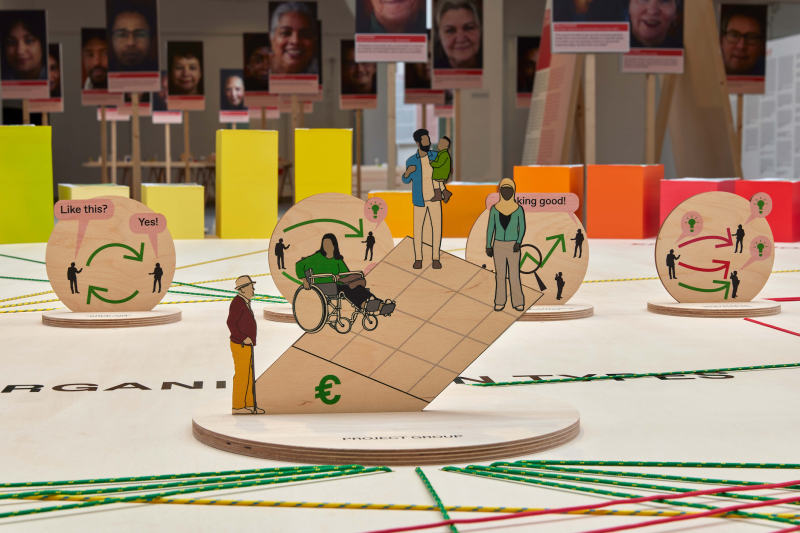
Energy Transition as Leverage (from: RECLAIMING THE COMMONS)
picture: Aad Hoogendoorn
Everything has to change
The way capitalism works and the relationships between government, businesses and civil society must change, especially the underlying power structures. We need a new balance of profit and loss that takes into account the importance of future generations and other forms of life without irresponsibly mortgaging the future. This requires profound transitions and a structural systems change. Only then can we reclaim the commons – what belongs to us together and should remain so, and what we take care of together, now and for the future.
Curators
The curators of the exhibition are George Brugmans (IABR) and Thijs van Spaandonk (Bright and Head Master Urban Design of the Rotterdam Academy of Architecture and Urban Design).
Currently, the lead designer of the IABR–Atelier Rotterdam is Eva Pfannes (OOZE Architects and Urbanists), who designed the LEAP and the toolboxes.
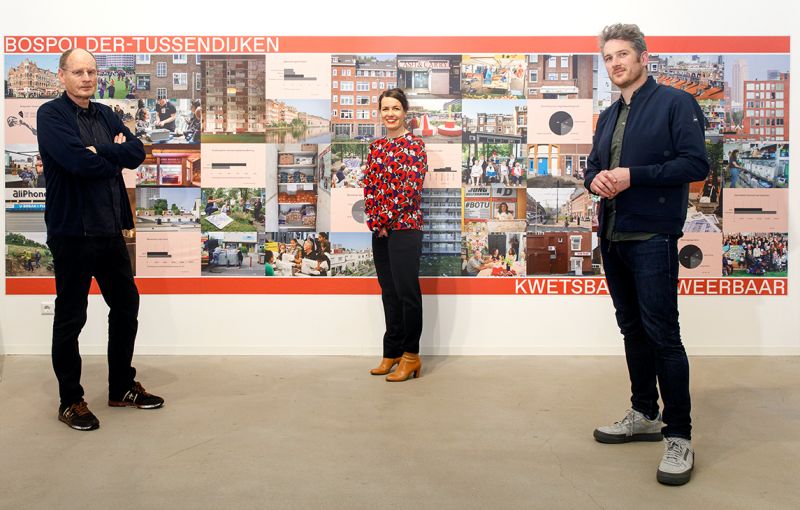
from the left: George Brugmans, Eva Pfannes and Thijs van Spaandonk
picture: Aad Hoogendoorn
DOWN TO EARTH: RECLAIMING THE COMMONS is open to the public from Wednesday June 9 through Sunday July 11, 2021, from Tuesday to Sunday, from 11 am to 5 pm. The exhibition is closed on Mondays.
Admission is free and registration is not necessary as long as the current corona measures are in force.
For all other pertinent visitors information, click here
ALL DATES ARE SUBJECT TO CHANGE
Given the pandemic, IABR follows the current guidelines of the Dutch Health Authority. So please remember that because of Covid-19 all dates are subject to change.
